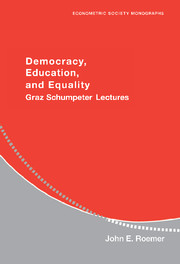Book contents
- Frontmatter
- 1 A Brief Overview
- 2 Models of Party Competition
- 3 Democratic Competition over Educational Investment
- 4 The Dynamics of Human Capital with Exogenous Growth
- 5 The Dynamics of Human Capital with Endogenous Growth
- 6 Estimation of Technological Parameters
- 7 Conclusion
- References
- Appendix: Proof of Theorems
- Index
3 - Democratic Competition over Educational Investment
Published online by Cambridge University Press: 05 January 2013
- Frontmatter
- 1 A Brief Overview
- 2 Models of Party Competition
- 3 Democratic Competition over Educational Investment
- 4 The Dynamics of Human Capital with Exogenous Growth
- 5 The Dynamics of Human Capital with Endogenous Growth
- 6 Estimation of Technological Parameters
- 7 Conclusion
- References
- Appendix: Proof of Theorems
- Index
Summary
THE POLITICO-ECONOMIC ENVIRONMENT
We will model a society that reproduces itself over many generations. At the initial date, there are households led by adults (parents) who are characterized by a distribution of human capital, that is, capacities to produce income. (As I wrote earlier, human capital has other values for a person.) Each parent has one child. The human capital the child will have, when he or she becomes an adult, is a monotone increasing function of his or her parent's level of human capital and the amount that is invested in his or her education. This relationship is deterministic, and describes the educational production function for all children. Thus, more investment is needed to bring a child from a poor (low human capital) family up to a given level of human capital than a child from a wealthier family. All parents have the same utility function: a parent cares about his or her household's consumption (which will be his or her after-tax income), and the human capital his or her child will come to have as an adult. We will, for simplicity, assume that adults do not value leisure. Thus, income will be earned inelastically with respect to taxation.
- Type
- Chapter
- Information
- Democracy, Education, and EqualityGraz-Schumpeter Lectures, pp. 35 - 64Publisher: Cambridge University PressPrint publication year: 2006

